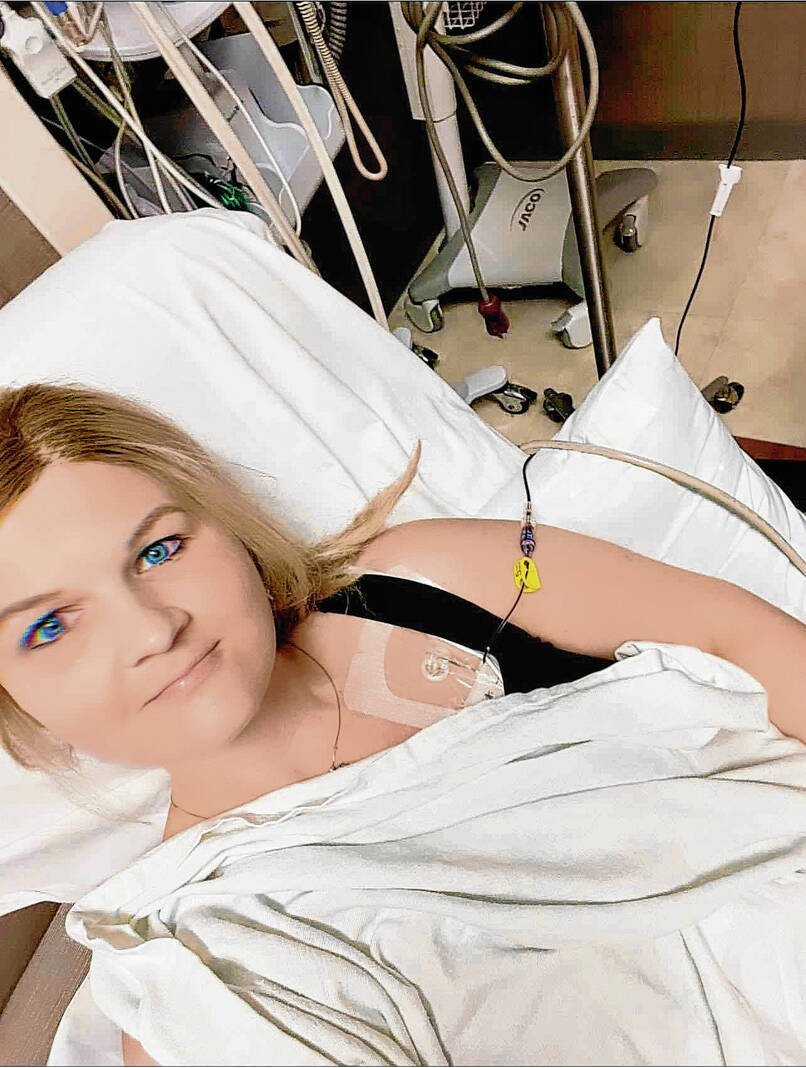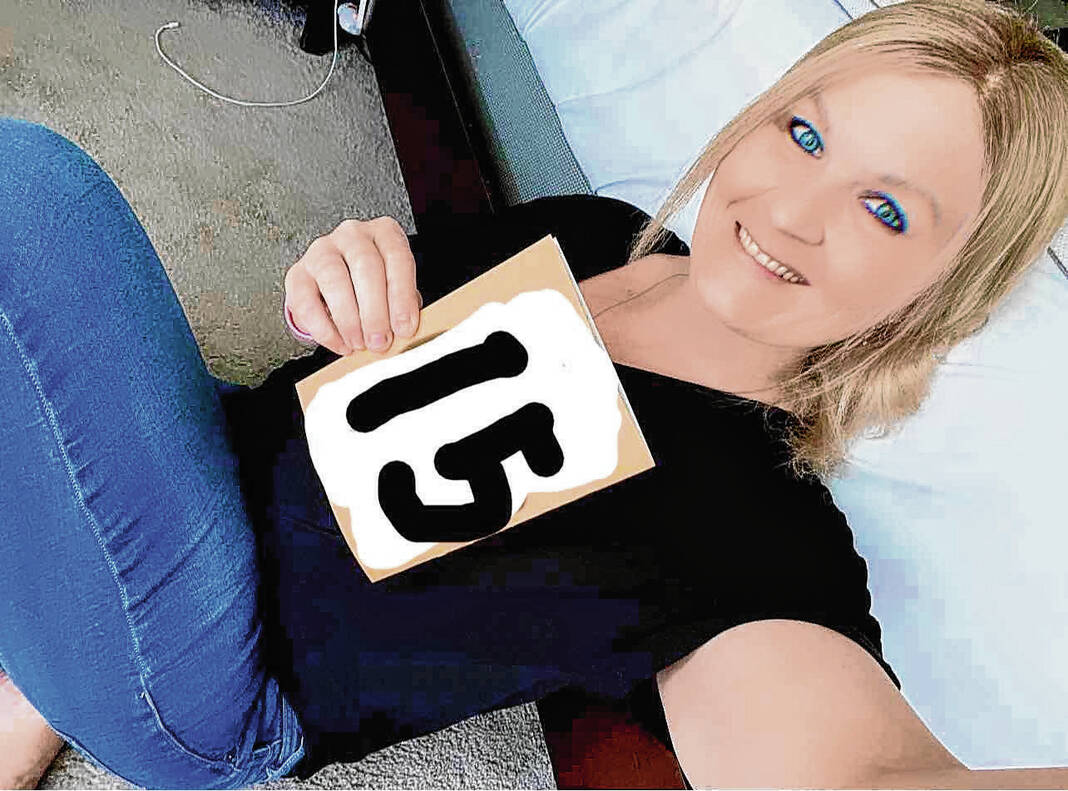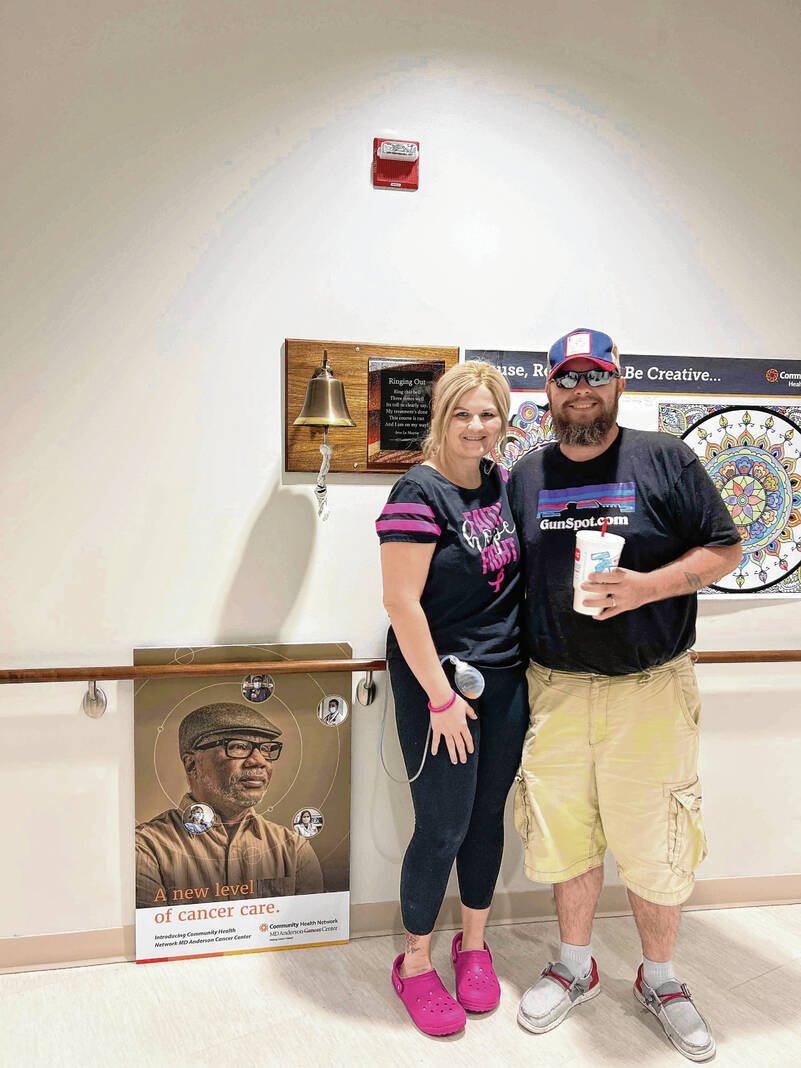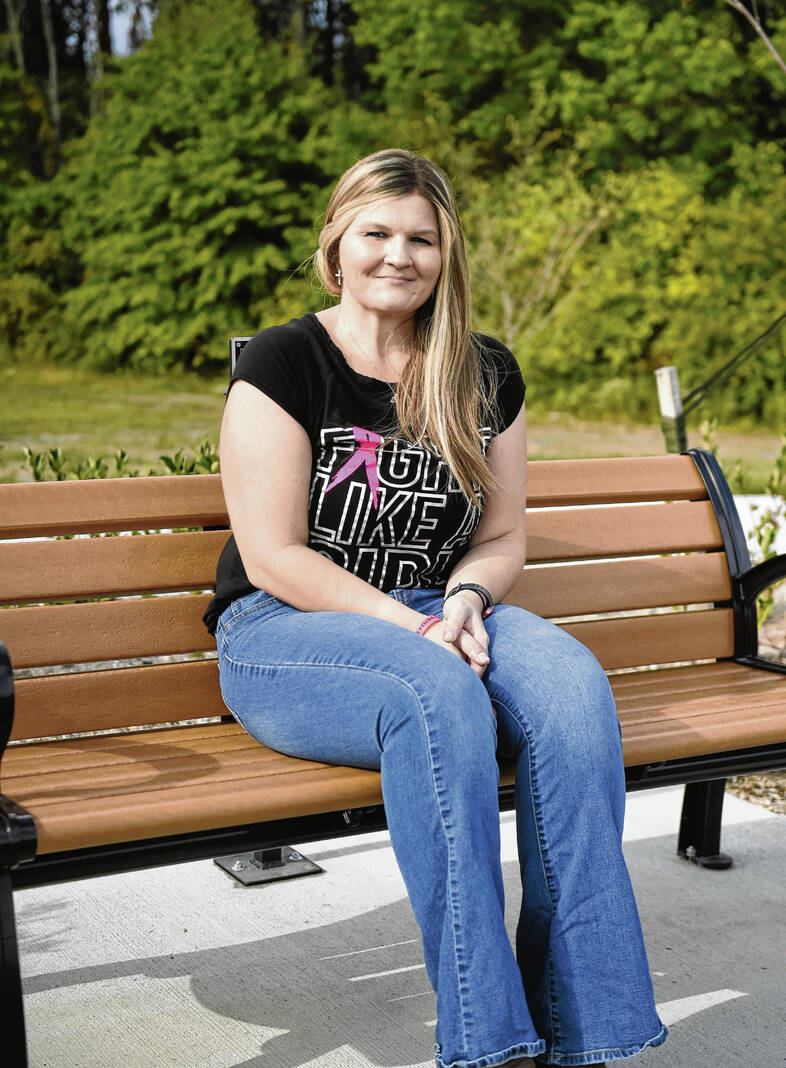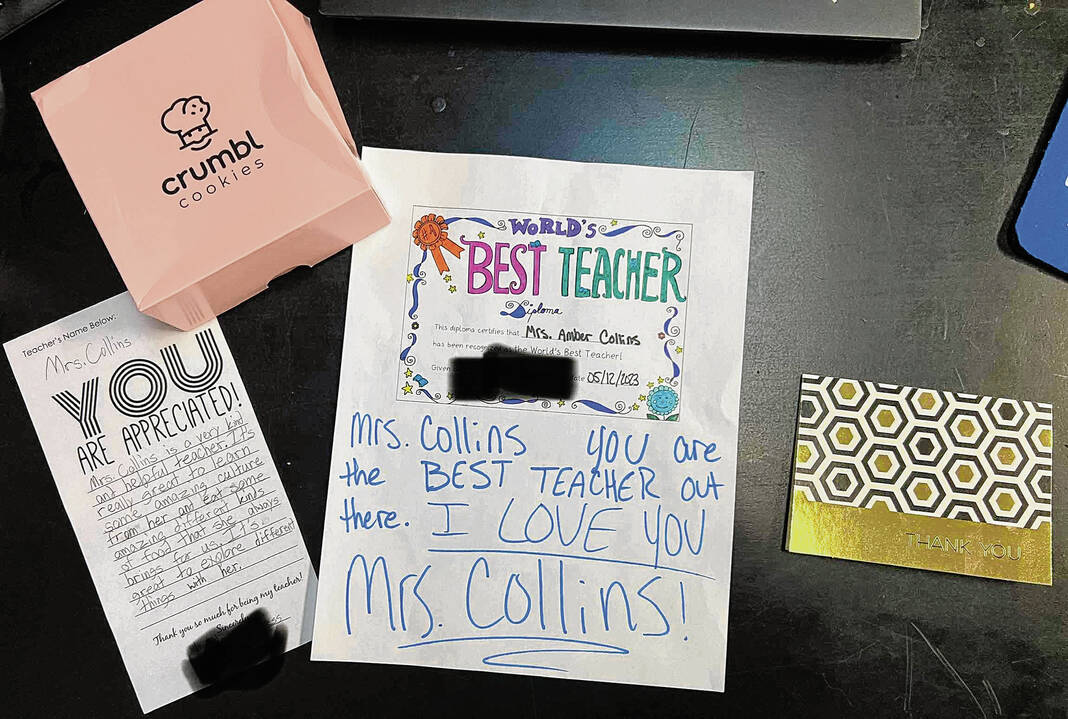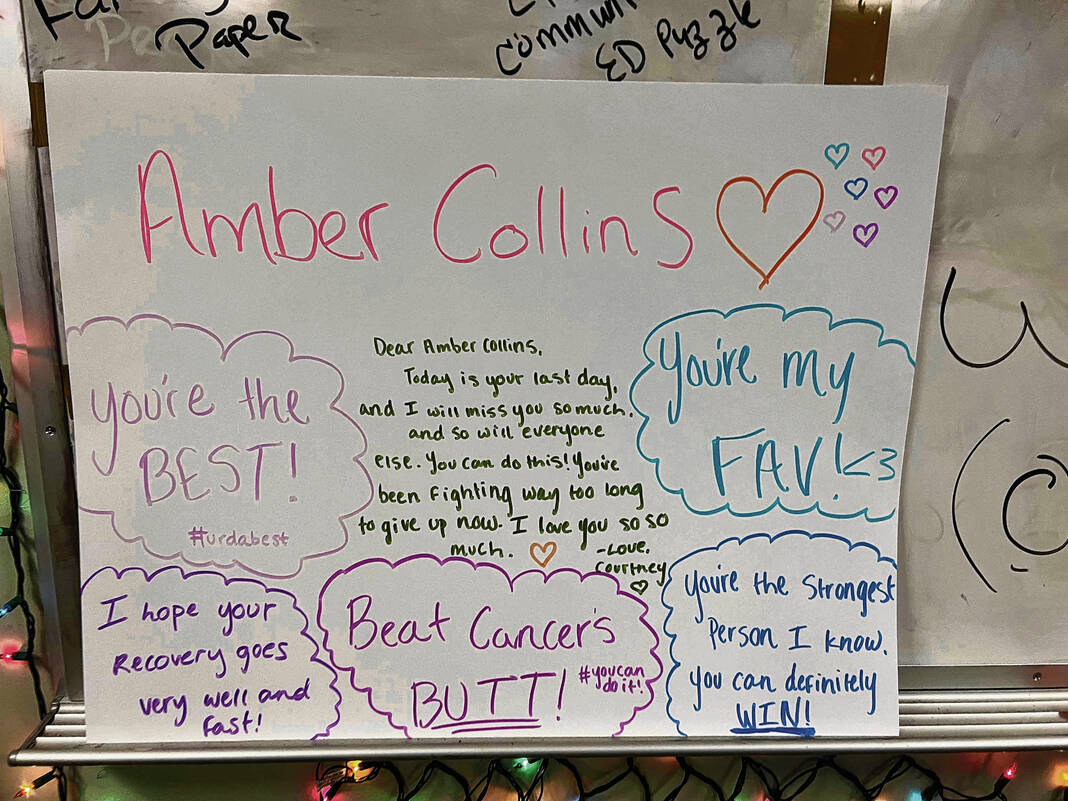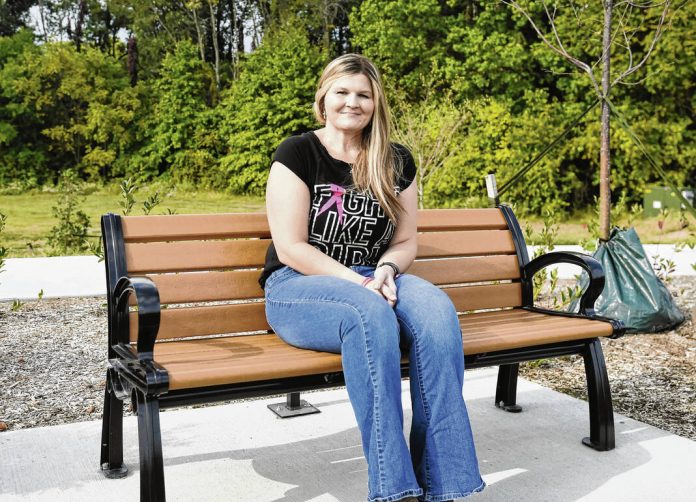
Amber Collins, a White River Township resident, was diagnosed in 2022 with triple-positive breast cancer with lymph node involvement. Though she has finished a portion of her treatment, she still faces reconstruction surgeries and 10 years of hormone therapy to keep the cancer at bay.
RYAN TRARES | DAILY JOURNAL
Each passing hour came with worse and worse news.
Amber Collins had gone for a mammogram after noticing a small indentation on her right breast in 2021. Though she couldn’t feel a lump, she scheduled an examination with her primary care physician, who told her it would only take about 30 minutes to find an answer.
Six hours later, Collins had gone through three different mammograms, an ultrasound and a biopsy, all of which revealed a terrible diagnosis — breast cancer.
“I went out in my car and just broke down crying,” she said.
Since that day, Collins has endured a hellish ordeal. The 38-year-old Center Grove-area resident was diagnosed with triple-positive breast cancer with lymph node involvement. Doctors have found four cancerous masses, aggressive growths feeding off her hormones.
To treat it, she’s gone through multiple surgeries, 16 weeks of chemotherapy, immunotherapy, radiation, five reconstruction surgeries, a hysterectomy, and faces 10 years of hormone therapy.
The Whiteland Community High School teacher has used her faith to hold her up through the worst of it.
“I don’t think there was one day where I didn’t read the Bible. To this day, I still do it, for my own sake, for those times when I just want to give up,” she said. “I could stay focused, and know that no matter what, God has me and protects me daily.”
All it took was a dimple on the right breast to turn Collins’ world upside-down.
She first noticed it in December of 2021. Though she thought it was strange, she wasn’t too concerned about her health; she felt great and wasn’t noticing any kind of illness.
Her annual OB/GYN exam coming up, but she figured she’d ask about it, just to be safe.
“I was telling her, ‘We’re doing my annual, but I have noticed this little spot.’ I didn’t think anything about it,” she said.
Collins’ doctor examined her, and while feeling the area of the indentation, she came across a tiny lump. Since Collins’ grandmother had gone through breast cancer before, her doctor ordered a mammogram — even though she was only 36 years old at the time.
Two weeks later, she came to Johnson Memorial Health for the mammogram. After the initial scan, the technician noticed something showing up but wasn’t sure what. To get a better angle, she took a few more images.
With each new test and scan, Collins started to feel worry gnawing at her. Her radiologist wanted to take an ultrasound and stay at the hospital until it was done.
“I called my husband and said, ‘I think something is up. They’re being really weird.’ Usually you can sense something weird,” she said.
When the medical team came back suggesting a biopsy, Collins knew this simple appointment had turned into something much more serious.
“As it kept going, I just asked them: Is this cancer? They see this all the time, they had to know,” she said. “He said he couldn’t tell me that, I had to talk to my doctor. But he wanted to send me to a breast surgeon in the oncology unit. I knew then it was cancer.”
Collins left Johnson Memorial Health that afternoon to meet again with her primary care physician, who confirmed she did have breast cancer, though they did not know exactly what kind.
“At that moment, I think I just went numb,” she said.
On Jan. 31, 2022, it was confirmed she had grade 3 invasive ductal carcinoma, meaning it has spread from the milk ducts to surrounding breast tissue. She scheduled a meeting with her breast surgeon oncologist, a medical oncologist, radiologist and plastic surgeon to talk about the path forward.
During the meeting, they revealed that Collins didn’t have two cancerous masses in her breast, she actually had four — all over 5 centimeters, which made the situation more dire. They weren’t going to be able to save either of her breasts; she would need a complete mastectomy.
On top of that, Collins’ cancer had a genetic mutation. The pathology reports found her masses were particularly receptive to three hormones known to fuel cancer growth. Collins had estrogen receptors and progesterone receptors, as well as testing positive for the HER2 protein that causes cancers to grow and spread more quickly.
“Basically, they threw all of this at me at once,” she said. “My life at the moment was shattered. I lost it. You never expect it, especially in your 30s.”
Collins faced a formidable path to recovery. In addition to a double mastectomy, she would need four months of chemotherapy, radiation and immunotherapy.
“They told me, pretty much, we’d have to do every possible thing in the book, starting with the hardest chemotherapy possible to nail this thing,” she said.
The pathology report also found her cancer had the Palb2 genetic mutation, a partner and localizer of the more well-known BRAC2. Even doing all of the treatment, she would have a 40% chance of recurrence.
Because of the mutation, Collins had to get a hysterectomy with ovary removal due to a higher risk of ovarian cancer.
“I sat in that office for about an hour and just cried,” she said. “Then I went to work.”
For much of her treatment, Collins tried to continue teaching. Her students gave her strength.
“Going to work, being with the kids, is what I loved doing. They kept my mind off of what I was going through during the day,” she said.
Her co-workers and administrators at Whiteland stepped up to support her when she needed it. Collins also leaned on her family: husband William, and three children, Kaydence, 17; Isaiah, 16 and Michael, 10.
“My kids were such troopers. They were really, really good about hiding their emotions. I know it affected them, but they were trying to be strong for me,” she said.
Still, they could only do so much. Chemotherapy almost broke her — because her cancer was so aggressive, she had to take a drug called doxorubicin. The medication is better known by a nickname: the Red Devil.
“It’s the worst you can get,” she said. “I didn’t want to do it, but I knew it had to be done.”
Another chemotherapy round featured the drug taxol, which caused Collins to go into anaphylactic shock. She lost her hair and had terrible nausea.
“I pretty much had every side effect known, except from dying from it,” she said.
But through the taxing nature of the treatment, Collins was determined to keep working. She wanted to use her situation as a teaching moment.
“Being with the kids is my purpose, my calling. Being able to work through that, to show the kids that you can go through adversity in life, and you can still come out on the other side and inspire others,” she said.
With the worst of treatment behind her, Collins is steeling herself for the next phase of her cancer journey. She has gone through two breast reconstruction surgeries already, with a third coming at the end of October. Because her cancer is hormone-fed, she has also started hormone therapy to drastically shut off the hormones and prevent a recurrence.
She’ll be on the therapy for the next five to 10 years. Some of the drugs have led to horrible side effects, including thoughts of self-harm and intense pain. She only recently tried another option.
“I’m starting to get side effects, but I’m hoping and praying and talking to God that, if it happens, that it’s very light instead of very extreme,” she said.
With everything she has gone through, Collins has taken time to reflect on her situation. For a long time, sharing her story was too emotional.
But she has started to see how she could help others.
“Some of my students, their family is going through it. So, being able to give them that inspiration of, look at me, I’m still going. Just have faith,” she said. “And also to talk to other women who are currently going through what I’m going through.”
The Collins File
Amber Collins
Age: 38
Diagnosis: Triple-positive breast cancer with lymph node involvement
Treatment: Multiple surgeries, 16 weeks of chemotherapy, immunotherapy, radiation, five reconstruction surgeries, a hysterectomy, and 10 years of hormone therapy.
What has cancer taught you?
“I don’t think there was one day where I didn’t read the Bible. To this day, I still do it, for my own sake, for those times when I just want to give up. I could stay focused, and know that no matter what, God has me and protects me daily.”
How has cancer changed you?
“It’s been a very touchy subject for me. Any time I talked about it, I was very emotional and I would breakdown. But now that I’ve talked about it so much, it’s better. Some of my students, their families are going through it. Being able to give them that inspiration that, look at me, I’m still going. And other women who are going through it. Whoever I can interact with.”
What would you tell someone just diagnosed?
“Never give up. Even when you feel like you’re world is crashing down. Have hope, and believe that there are miracles and, even if you’re told there’s a good chance you might live a certain life, I truly believe that if you believe in miracles, they can happen.”


